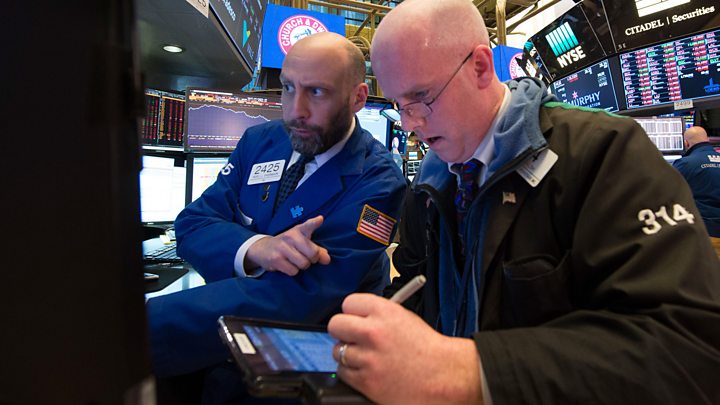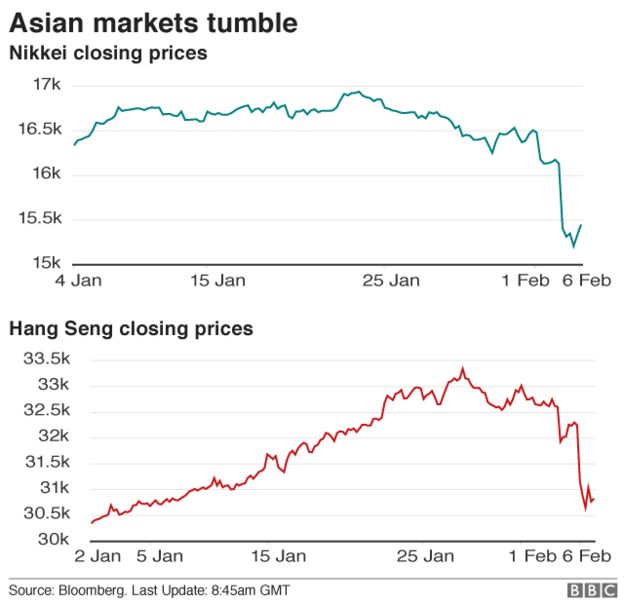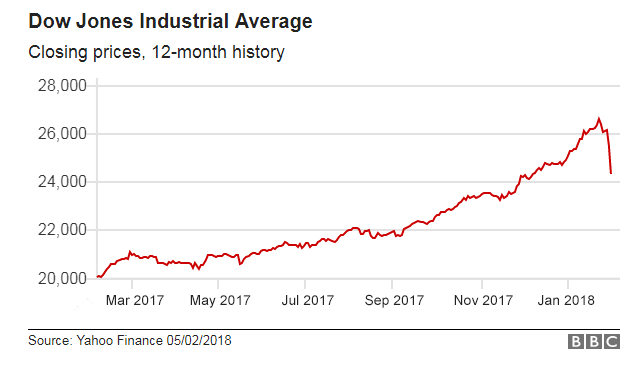
Asian markets plunged on Tuesday as investors dumped stocks following the biggest US market fall for six years
At one point Japan’s Nikkei 225 index was down 7%, but recovered some of those losses to close 4.7% lower.
London, Frankfurt and Paris all fell sharply when they opened on Tuesday with new losses of up to 3%. In the US overnight the Dow lost 4.6%.
The falls follow some good years for investors. In 2017 the Dow was up 25%, helped by a resurgent economy.
Strong profits and low interest rates also underpinned the positive investment climate.
This global sell-off began last week after a solid US jobs report fuelled expectations that the economy’s strength was such the Federal Reserve would need to raise interest rates faster than expected.

Will falls turn into rout? Analysis, Kamal Ahmed, economics editor
The softness of markets over the last few days is down to one thing.
As monetary policy begins its long journey away from the trillions of pounds of stimulus pumped into the system to keep the economic ship from the rocks, shareholders are beginning to wonder how much of their investments are in companies with strong fundamentals.
And how much is simply holding up an asset bubble – frothy prices led ever higher in an era of ultra low interest rates and cheap money.
Fingers are hovering over the “sell” button.
And once investors start looking at their portfolio and selling out of the froth, automatic algorithmic trading tends to “chase the dip”.
Read more from Kamal here:

Jane Sydenham, investment director at the stockbrokers Rathbones, told the BBC the falls did not appear to herald a serious change of sentiment: “It is always a bit too early to tell, but I think these recent market falls are in the nature of a correction.
“What we have to remember is stock markets have had a very smooth ride upwards and we’ve not had a fall of more than 3% for 15 months. There’s been a real lack of volatility, which is very unusual.”
She added that bear markets tend to happen ahead of a recession and at the moment growth forecasts were being upgraded.

Erin Gibbs, portfolio manager for S&P Global Market Intelligence, said: “This isn’t a collapse of the economy.
“This is concern that the economy is actually doing much better than expected and so we need to re-evaluate.”
One country whose immediate economic outlook remains stagnant is Japan. The authorities there said there was little chance of interest rates being increased.
The Bank of Japan’s governor, Haruhiko Kuroda, ruled out the possibility of raising interest rates in the near future. He said it was “inappropriate” to do so with inflation still about half its 2% target.
But markets in Asia typically follow the lead from the US.
Elsewhere in the region, Hong Kong’s Hang Seng index closed down 1,649.8 points – or 5.12% – at 30,595.42 and South Korea’s Kospi index gave up 2.6%. Australia’s benchmark S&P/ASX 200 lost 3.2%.
- Live: Global stock markets slump
- Asia markets are following Wall Street’s lead – but why?
- The 2018 economy: What to watch
What happened in the US?
On Monday the Dow Jones Industrial Average index tumbled 1,175 points, or 4.6% to close down at 24,345.75.
The decline was the largest in percentage terms for the Dow since August 2011, when markets dropped in the aftermath of “Black Monday” – the day Standard & Poor’s downgraded its credit rating of the US.

The drop on the Dow was closely followed by the wider S&P 500 stock index, down 4.1% and the technology-heavy Nasdaq, which lost 3.7%.
The White House moved to reassure investors saying it was focused on “long-term economic fundamentals, which remain exceptionally strong”.
- What has driven the Dow’s surge?
- US jobs and wages rise in January
- The US economy in six charts
Will this have long term impact?
Analysts say that in the short term, investors should be prepared for choppier stock markets.
Joel Prakken, chief US economist for IHS Markit, predicts share price gains will be limited over the next two years.
“The difference between this year and last year is we’re going to see more periods of volatility like this as the market reacts to higher inflation,” he said.
“We’re just not used to it because it’s been so long since we’ve had a significant correction.”
However, he added that markets would need to deteriorate more significantly for him to start to worry about the broader economy.
Asian markets, on the other hand, have benefitted from record low US interest rates in the last decade because money has flowed into Asia in search of stronger returns. Analysts say the expected rate rises could impact Asia over the longer term.
source:-bbc



